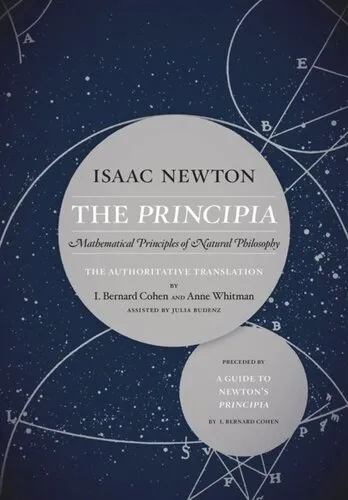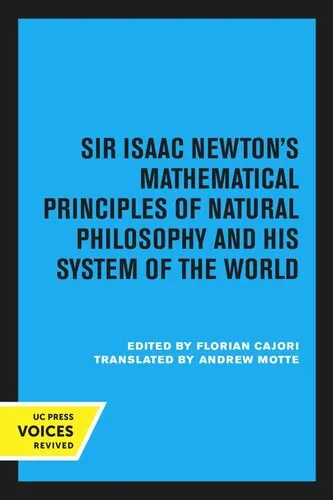The Principia: The Authoritative Translation and Guide: Mathematical Principles of Natural Philosophy
4.8
Reviews from our users

You Can Ask your questions from this book's AI after Login
Each download or ask from book AI costs 2 points. To earn more free points, please visit the Points Guide Page and complete some valuable actions.Related Refrences:
Introduction to 'The Principia: The Authoritative Translation and Guide'
Sir Isaac Newton's 'The Principia: The Authoritative Translation and Guide: Mathematical Principles of Natural Philosophy' is a seminal work that laid the foundational principles of classical mechanics. This masterpiece is a translation of Newton's 'Philosophiæ Naturalis Principia Mathematica,' in which he formulates the laws of motion and universal gravitation. This book is an essential read for anyone keen on understanding the principles that have shaped modern physics and the way we perceive the universe.
Detailed Summary of the Book
The Principia is structured in three books. Book I, 'The Motion of Bodies,' deals with the mathematical principles of how bodies move in space and time. Newton introduces the concept of absolute time and space, leading to the formulation of the three laws of motion, which form the basis for classical mechanics.
Book II, 'The Motion of Bodies (In Resisting Media),' expands on the motion of objects through fluids, discussing the impact of resistance. Here, Newton examines how bodies succeed in resisting media like air and water, providing fundamental insights into fluid dynamics.
Book III, 'The System of the World,' is where Newton applies the laws of motion and gravitation to explain the solar system's mechanics. By using these principles, Newton elaborates on the movement of celestial bodies and establishes a coherent framework that unifies terrestrial physics and the cosmos.
Key Takeaways
- Introduction of the three laws of motion which form the base of classical mechanics.
- The universal law of gravitation, explaining the attractive force between masses.
- Formulation of the mathematical principles to describe planetary motion.
- Pioneering work that connects physics with mathematical rigor.
Famous Quotes from the Book
"To every action, there is always opposed an equal reaction."
"I can calculate the motion of heavenly bodies, but not the madness of people."
Why This Book Matters
'The Principia' is more than just a scientific treatise; it represents a pivotal moment in scientific history where mathematics is used to understand the physical world. The work of Isaac Newton was revolutionary, influencing centuries of research and discovery in physics and beyond.
His clarity and rigor in addressing the motion of celestial and terrestrial bodies laid the groundwork for later developments by scientists such as Albert Einstein. Despite the advances in physics over the years, Newton’s laws of motion continue to be a fundamental aspect of physics education.
This book has not only been instrumental in the development of physics but also in influencing how scientific inquiry has evolved, emphasizing the importance of empirical evidence and mathematical verification. For anyone interested in the sciences, 'The Principia' is a timeless piece that enriches the understanding of the universe.
Free Direct Download
You Can Download this book after Login
Accessing books through legal platforms and public libraries not only supports the rights of authors and publishers but also contributes to the sustainability of reading culture. Before downloading, please take a moment to consider these options.
Find this book on other platforms:
WorldCat helps you find books in libraries worldwide.
See ratings, reviews, and discussions on Goodreads.
Find and buy rare or used books on AbeBooks.



